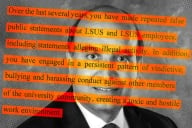You have /5 articles left.
Sign up for a free account or log in.
In a major win for religious colleges, the California Supreme Court on Monday ruled, 4-3, that even "pervasively sectarian" institutions can have bonds issued by government agencies on their behalf, potentially saving them millions of dollars in the costs of construction.
To be eligible, the colleges must offer a broad array of courses and the facilities must be used in ways that are equivalent to the use of facilities at secular institutions. So dormitories, dining halls, and classrooms for not specifically religious courses would be fine, but presumably the funds could not be used for churches or to house academic departments focused on religious instruction.
In the past, colleges that have religious ties, but in which religion does not play a dominant role in the campus ethos have won the right to have bonds issued on their behalf, with the associated tax benefits. But Monday's ruling goes much further in extending that right to colleges where religion is central to everything on the campus. As a result, the dissent said that the majority had gone too far.
The ruling came in a case involving requests to issue bonds by Azusa Pacific University, California Baptist University, and the Oaks Christian School.
As described by the court's majority opinion -- and consistent with the universities' descriptions of themselves on their Web sites -- the two universities offer a broad range of courses, and take faith seriously. California Baptist expects students to live by "biblically based Christian principles" and to attend church services. Faculty members must be Christians and 51 percent must be Baptists. But only about 5 percent of students major in Christian or ministry studies.
Similarly at Azusa Pacific, only about 7 percent of students major in religious studies, but the institution's faith is central. All faculty members must be Christians. Students must exhibit "moral character" consistent with religious belief and must complete 120 hours of student ministry assignments.
The institutions want the bonds issues on their behalf for such facilities as dining halls, dormitories, athletic facilities and classroom buildings.
In the ruling, the Supreme Court of California analyzed tests on church-state separation that have been applied under both the California and U.S. constitutions. The majority opinion stressed that separation of church and state did not require "hostility" toward religion, and it applied a series of tests, which the colleges' bond proposal passed.
The key hurdle for the religious colleges was a test on whether the bonds would -- in the majority's words -- "serve the public interest and no more than incidentally benefit religion." The majority said that the colleges would pass this test provided that they used the funds for facilities that are not religious and nature and that any educational offerings in these buildings be for instruction that is comparable to that at secular institutions.
"The straightforward assessment ... is whether the academic content of a religious school's course in a secular subject such as math, chemistry, or Shakespeare's writings is typical of that provided in nonreligious schools," the Supreme Court ruled. The decision went on to say that enforcing this requirement does not require monitoring of what is said in class each day or limit a professor's freedom of speech.
"When a school establishes, through its course descriptions or otherwise, that the academic content of its secular classes is typical of comparable courses at a public or other nonreligious schools, it is not necessary to scrutinize the school's say-to-day classroom communications," the ruling said. "The circumstance that a teacher may, in addition to teaching a course's religiously neutral content, express an idea or viewpoint that may be characterized as 'religious' does not result in a benefit to religion that is more than incidental to the state's primary purpose of enhancing secular education opportunities for California residents."
The key, the court said, was to make judgments on the use of the facilities, and not the broad religious goals or identity of a college. Citing previous rulings by their court, the justices noted that fire and police departments provide the same protection for religious institutions as for secular institutions, so there is no automatic ban on government assistance to even the most religious of institutions.
Lawyers involved in the case told California newspapers that they thought the colleges involved -- and most religious colleges -- would have no difficulty meeting the tests set by the court.
The three judges who dissented said that the majority paid too little attention to the benefits of a government-issued bond to the colleges. By saving money on facilities, even if those are facilities for secular purposes, the colleges gain additional funds to advance their religious missions, the dissent said.
In that context, the dissent said, it was relevant just how significantly religion pervades campus rules and programs.
"Given the trial court's uncontested findings that the schools are 'organized primarily or exclusively for religious purposes,' "restrict admission of students by religious criteria,' 'discriminate on the basis of religion in hiring faculty,' and 'integrate religion ... into classroom instruction,' the proposed bond agreements clearly violate" the state Constitution's separation of church and state, the dissent said.
The Constitution, the dissent said, "simply does not permit a public entity to act as a fundraiser for schools of this nature."








